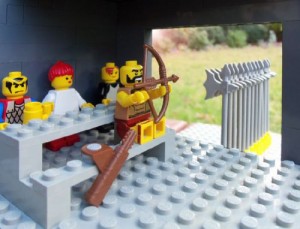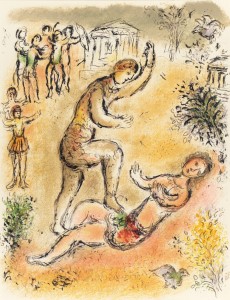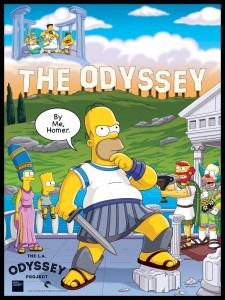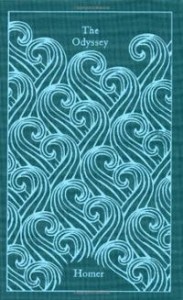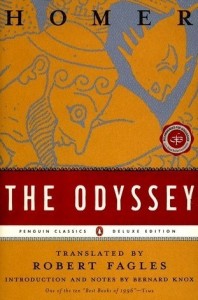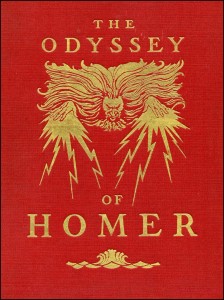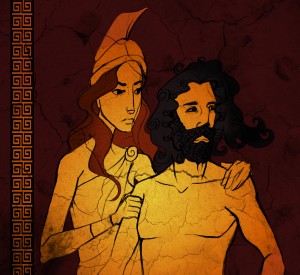
Welcome back, those of you who are reading Homer’s Odyssey!
And, for those of you who chose to sit this one out (perhaps wisely, grumble), you’re welcome for the recaps, especially if you’ll be joining us next month when we start the Ulysses readalong.
(Because I seem to be constitutionally incapable of saying no to book discussions. Because the only thing better than reading a book is reading a book then talking about it with someone/s smart and funny!)
VT asked if I was “glad” to be doing the simultaneous reads of Sandman and The Odyssey. Not really. I wish Sandman could have been some other time, and spread over a longer period. One week for each graphic novel would have been ideal. But, this was the best time for others to read Sandman, and this timing for Odyssey fit nicely with reading Ulysses next year prior to Bloomsday, so, as the kids say these days, it is what it is.
Well, let’s get to it, then. There were a few weird and hilarious moments for me this week.
Book 15: Ithaca at Last
I am not a fan of gifs and such, but I really felt the call for an exclamation point with this chapter title, and that reminded me of Elaine from Seinfeld

So: Ithaca at Last!
At the end of 12, Odysseus finished his tale. Alcinous agrees that it’s time for him to go, and asks, nay, demands that his guests pony up even more swag for Odysseus than they did before.
Then recover our costs with levies on the people:
it’s hard to afford such bounty man by man.” (Book 13 l.15-16)
So, in other words, cough up a tripod or cauldron, then tax your people to pay for it. Glad I’m not one of his subjects.
Odysseus and the Phaacians sail off with the swag. O relaxes and falls asleep, so when the ship hits shore (hard) they drag him off and leave him sleeping amid his treasure in order to book it back home. Alas, Poseidon is still pissed about O killing his son and gripes to Zeus that O is returning with more treasure than if he hadn’t been screwed (literally and figuratively) and shipwrecked multiple times after the war.
Zeus says, bro, what is your problem? You’re a powerful god. Do what you want, man.
Poseidon says, well, I know that messing with Odysseus yet again might piss you off, so how about I mess with those Phaeacian mother cussers. I TOLD them not to offer hospitality to strangers. I’ll crush their ship and put a mountain around the port!
Zeus says, “Wait, dear brother,” and what I expected him to say was something like “way harsh, dude” but instead he says, wouldn’t it be great if you could turn the ship to stone just as it was getting there! THEN put up a mountain. BAM!
Thus, just as the ship gets into harbor and the sailors are glad to be home and the city excited to see them back, poof, the ship and crew are turned to stone.
Alcinous suddenly recalls that prophecy back in Book 8.
D’oh.
Quick, he says, sacrifice a dozen bulls to Poseidon and maybe he won’t put up the mountain, too! And then…
Odysseus wakes up, doesn’t recognize Ithaca, bitches about the poor, stoned Phaecians who got him there so fast and didn’t take one jot or tittle of his treasure.
Athena appears, in disguise as per her usual. Odysseus invents some tremendous lies and then she mocks him and reveals herself and says to stash the booty. Then she disguises him as a smelly beggar and tells him to go see…
Book 14: The Loyal Swineherd
The swineherd recaps the sitch in Ithaca, if you’d forgotten. Which you totally haven’t.
And then, something really weird happens in the storytelling. It’s as if Odysseus is later telling this back to the swineherd (whaaat?)
And you repled, Eumaieus, loyal swineherd,
“It’s wrong, my friend, to send any stranger packing…” (Bk 14, l. 63-64)
Then Odysseus tells a bunch more tremendous lies, then passive aggressively tells a story about a time when it was cold and he forgot his cloak in the war. And the swineherd is really nice about it and doesn’t roll his eyes, just goes and gets his best cloak of goat skin and Odysseus snuggles up in it next to the fire and falls asleep again.
Over and over, the swineherd says, when Telemachus gets back, we’ll get you a proper cloak and shirt.
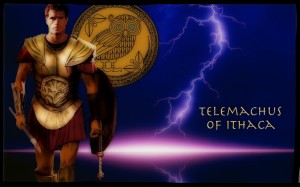
Book 15: The Prince Sets Sail for Home
After leaving Odysseus last book, Athena flies off to see Telemachus, who is sleeping with Nestor’s son, Pisistratus. Go home, she says. So he prepares a ship, laden with gifts. An eagle appears with a dead goose. Helen says, the eagle is Odysseus and the goose is those silly suitors, whom he will kill. Yay, says everybody.
Just as they’re about to leave, some guy, a prophet named Theoclymenus, shows up, is the subject of lengthy story that does not have obvious relevance to the story, and asks to bum a ride. No prob, says Telemachus.
Meanwhile, back at the swine shack, the nice swineherd tells his lengthy backstory, and then they go to sleep again.
At this point Telemachos sneaks into Ithaca (because a bunch of the suitors are waiting to ambush and kill him) and tells Theoclymenus that things are a little dicey on the homefront. Then a hawk flies by with a dove in its mouth and Theo says Telemachus’ line will reign forever in Ithaca. T then foists Theo off on a spearsmen, and heads to the swine shack, because as we know from Book 14’s title, he is a Loyal Swineherd.
So, that’s it for this week! Moving right along, as the Muppets sang. What did everyone else think? Did you find the sudden POV switch with Odysseus and Eumaeus as weird as I did? The backstories of Theo and the swineherd as boring as I did? Do you think Poseidon put up the mountain or was appeased by 12 bulls?
Discuss it in the comments, or on Twitter with the hashtag #TCOdyssey.
Previous Posts:
Odyssey readalong schedule link
Week one books 1-3: link
Week two books 4-6: link
Week three books 7-9: link
Week four books 10-12: link
